Autism Complications
Understanding the Complexities and Challenges in Autism Spectrum Disorder

Introduction to Autism and Its Health Implications
Autism Spectrum Disorder (ASD) is a complex developmental condition characterized by differences in brain development that impact social interaction, communication, and behavior. While it is primarily recognized as a neurodevelopmental disorder, ASD is also associated with a broad array of physical and mental health complications that can influence quality of life, development, and overall well-being. This article explores the common health conditions linked to autism, the challenges faced by individuals with ASD, diagnosis and management strategies, contributing factors, and the latest scientific insights into secondary risks.
Common Physical and Mental Health Conditions in Autism
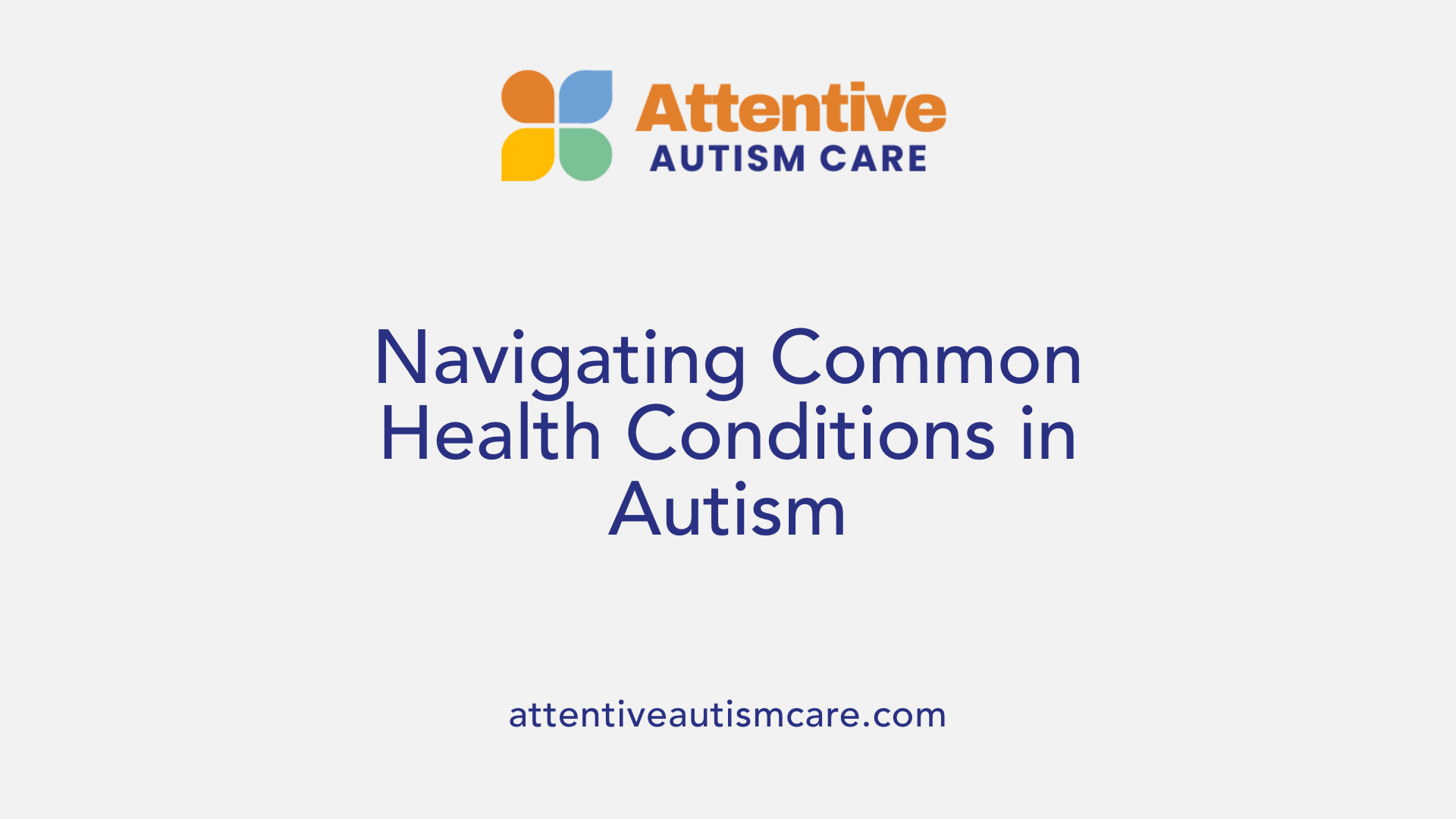
What are some common physical and mental health conditions linked to autism?
Individuals with autism spectrum disorder (ASD) often face a variety of health challenges that can affect their quality of life. These conditions span neurological, gastrointestinal, sleep, immune, and mental health domains.
Neurological issues such as epilepsy, migraine, and brain structural abnormalities
Neurological problems are prevalent among those with ASD. Many experience seizures, typically starting in childhood or adolescence, which are often associated with comorbid conditions like epilepsy occurring in about 5% of children and 12.1% of adults on Medicaid. Structural brain differences are also common, involving areas critical for social and emotional processing, such as the prefrontal cortex and amygdala. Other neurological disorders include migraines, macrocephaly, hydrocephalus, and cerebral palsy.
Gastrointestinal problems like constipation, reflux, and bowel inflammation
Gastrointestinal (GI) issues affect a significant portion of individuals with ASD. Studies cite that around 21% experience GI disorders, including chronic constipation, abdominal pain, gastroesophageal reflux (GERD), and bowel inflammation. Moreover, up to 85% of autistic children might encounter problems like diarrhea or bowel inflammation, which can complicate behavioral and developmental progress.
Sleep disturbances affecting over half of autistic individuals
Sleep issues impact more than half of those with ASD. Disrupted sleep can lead to difficulty concentrating, increased irritability, and overall decreased well-being. Sleep disturbances often exacerbate behavioral challenges, interfere with learning, and lower quality of life for both children and adults.
Allergic and immune-related conditions like food allergies, asthma, and immune irregularities
Many autistic individuals also contend with immune system irregularities, including food allergies and asthma. These immune-related conditions can contribute to discomfort and complicate health management. For example, food selectivity and sensitivities are common, with up to 70% of children exhibiting atypical eating behaviors—often including aversions to certain tastes or textures.
Additional health concerns
Beyond these primary conditions, individuals with autism frequently experience other challenges such as sensory processing irregularities, which make some stimuli overwhelming or unnoticeable, and motor or growth-related issues. Reports also indicate elevated risks for obesity, diabetes, and the presence of tumorous growths linked to genetic conditions like tuberous sclerosis.
Overview of health condition prevalence in autism
| Condition | Percentage/Prevalence | Notes |
|---|---|---|
| Epilepsy | 5% of children, 12.1% of adults | Often beginning in childhood or adolescence |
| Gastrointestinal disorders | Over 20%, potentially up to 85% in children | Includes constipation, reflux, bowel inflammation |
| Sleep disturbances | Over 50% | Disrupts daily functioning and learning |
| Anxiety | 17.1% of children, 26% of adults | Frequently co-occurs with ASD |
| Depression | 7.5% of children, 20.2% of adults | Symptoms include sadness and loss of interest |
| Autism-related neurological issues | Common at various levels | Includes structural differences, seizure disorders |
| Immune irregularities | Common, including allergies and asthma | Contribute to overall health challenges |
Recognizing these health variations helps in providing targeted and comprehensive care for those with autism, improving their overall well-being and functional capabilities.
Addressing Challenging Health Risks Beyond Core Symptoms
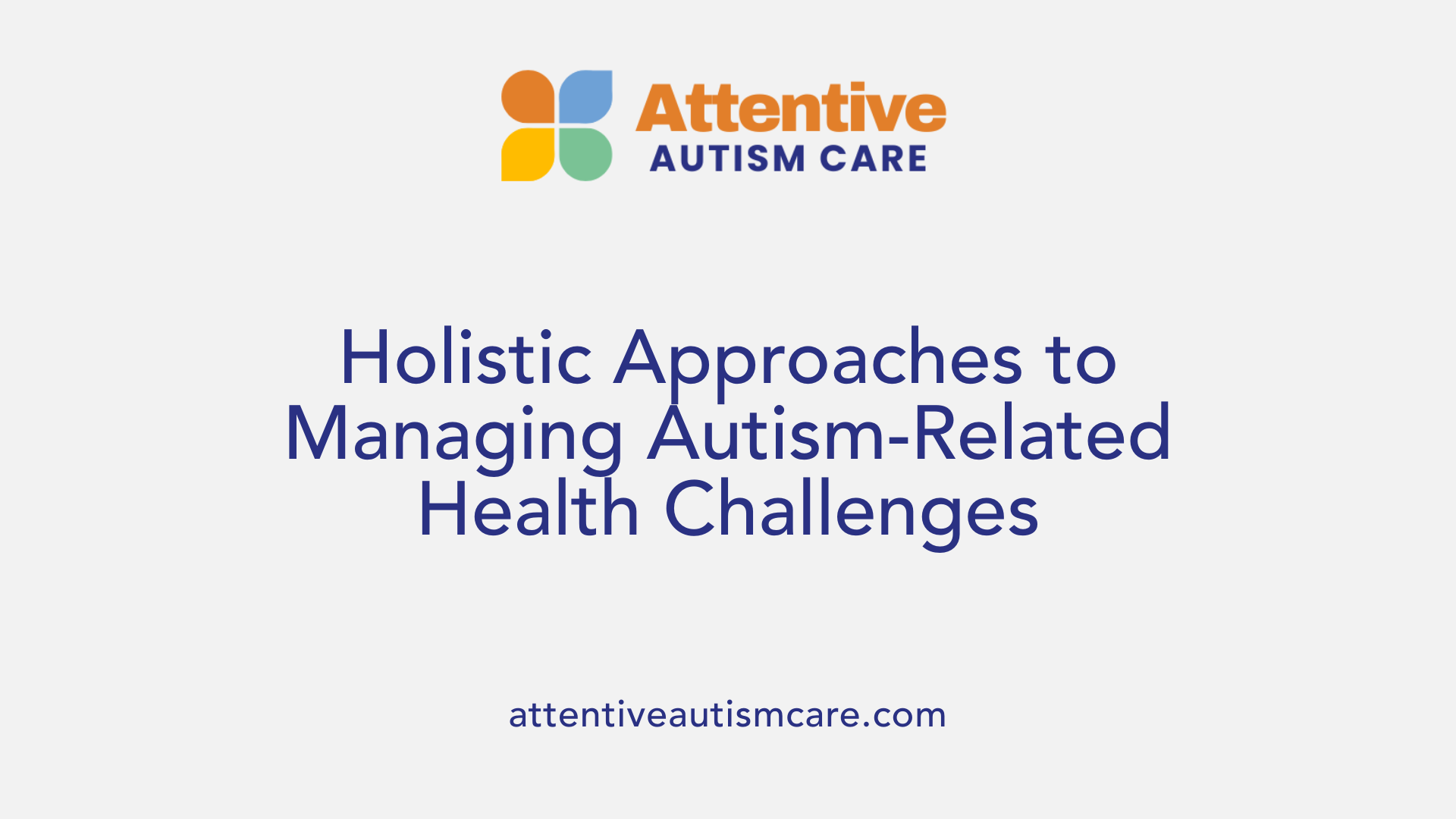
What are the potential health challenges faced by individuals with autism spectrum disorder?
Autism spectrum disorder (ASD) is often associated with behaviors and communication difficulties, but it also involves a broad spectrum of health challenges that can significantly impact daily life. Recognizing these issues is crucial for providing comprehensive support and care.
One of the most common health concerns among individuals with ASD is gastrointestinal (GI) disorders. Studies indicate that up to 21% of autistic children experience stomach or intestinal problems. These can include chronic constipation, abdominal pain, gastroesophageal reflux, and inflammation of the bowel. Such gastrointestinal issues may cause ongoing discomfort, affect nutrition, and exacerbate behavioral challenges.
In addition to digestive problems, neurological issues are frequently observed. Epilepsy is notably prevalent, with around 5% of autistic children and 12.1% of autistic adults on Medicaid experiencing seizures or related symptoms like unexplained staring spells, involuntary movements, confusion, or severe headaches. The neurological differences in brain structure and function among individuals with ASD can also include migraines and structural brain variations, which may influence cognitive and emotional processing.
Sleep disorders are another significant concern. Many autistic individuals, both children and adults, suffer from disrupted sleep patterns such as difficulty falling asleep, staying asleep, or experiencing restful sleep. Poor sleep quality can worsen behavioral problems, hinder learning, and lower overall quality of life. For children, disturbed sleep may interfere with development and daily routines, while adults may experience heightened anxiety and depression.
Beyond sleep and neurological challenges, individuals with ASD often face other health issues like allergies, immune system irregularities, and sensitivities. Some may have heightened reactions to certain foods, environmental stimuli, or develop immune-related conditions, which can further impact their physical health and comfort.
These overlapping health concerns highlight the necessity for an integrated healthcare approach. Regular monitoring, early diagnosis, and tailored treatment plans are essential to manage these complex health risks. For instance, addressing gastrointestinal discomfort can improve mood and behavior, whereas controlling seizures can enhance cognitive functioning.
In summary, individuals with ASD frequently encounter multiple co-occurring medical conditions that extend beyond core behavioral symptoms. By focusing on comprehensive health management—including gastrointestinal, neurological, sleep, and immune system issues—caregivers and health professionals can significantly improve overall well-being and quality of life for those living with autism.
Diagnostic Strategies and Treatment Approaches for Autism-Related Health Conditions
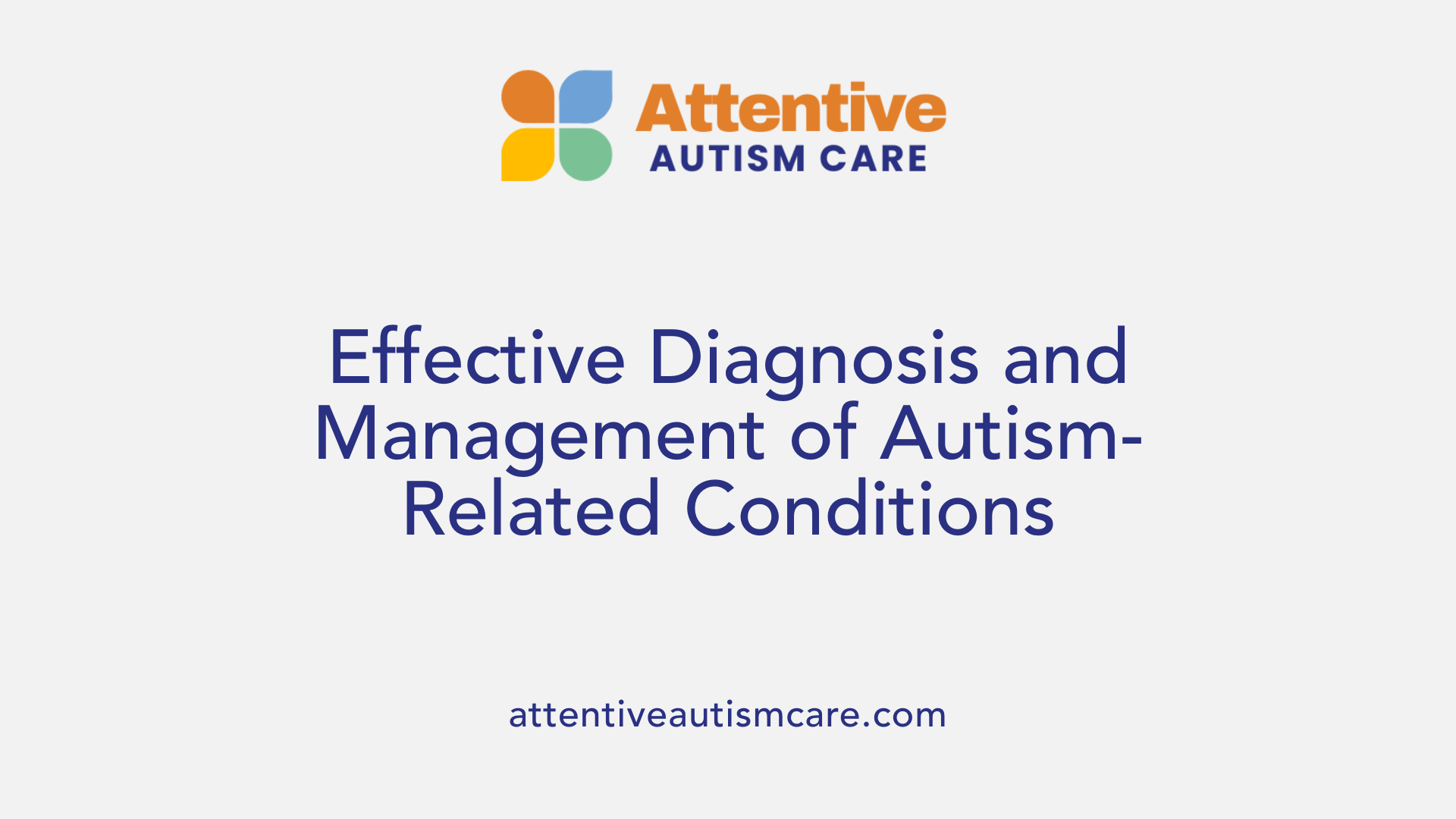
How are health conditions related to autism diagnosed and managed?
Autism spectrum disorder (ASD) is primarily diagnosed through behavioral assessments and careful observation of developmental and social skills. Since there is no medical test for autism, professionals rely on standardized tools such as the DSM-5 criteria and screening instruments like the Modified Checklist for Autism in Toddlers (M-CHAT). Early screening and diagnosis are vital because they enable timely intervention, which can significantly improve outcomes.
Evaluating co-occurring health conditions is also essential. For example, the high prevalence of gastrointestinal (GI) issues—such as constipation, abdominal pain, and reflux—often requires medical evaluations, including physical exams and possibly imaging. Seizures are common for some individuals with autism, especially in childhood or adolescence, and are diagnosed with electroencephalograms (EEGs). Sleep disturbances, feeding difficulties, and sensory processing issues may need assessments by specialists like sleep medicine experts or dietitians.
Genetic testing can further refine diagnosis, particularly when syndromic features are present. Tests might include chromosome analyses or gene panels to identify conditions like fragile X syndrome or tuberous sclerosis, both associated with autism.
Managing these health conditions involves a multidisciplinary approach. Behavioral therapies such as Applied Behavior Analysis (ABA), along with speech and occupational therapy, are fundamental for developing communication, social skills, and daily living abilities. Educational supports tailored to individual needs also play a key role.
When it comes to medication, clinicians use them selectively to target specific symptoms like irritability, hyperactivity, anxiety, or seizures. Dietary interventions and alternative therapies are also explored, but evidence supporting their effectiveness varies, and they should be integrated with medical guidance.
Coordination among healthcare providers, caregivers, and educators forms the cornerstone of effective management, emphasizing early intervention and ongoing support to enhance quality of life for individuals with autism. Monitoring these health conditions over time ensures adjustments in treatment plans to meet changing needs.
Additional considerations in diagnosis and management
| Aspect | Description | Typical Tools/Interventions |
|---|---|---|
| Behavioral assessments | Observing social skills, communication, behaviors | ADOS, DSM-5 criteria, clinician observation |
| Co-occurring disorders | Detecting epilepsy, GI issues, sleep problems, etc. | EEGs, GI assessments, sleep studies, psychological evaluations |
| Genetic testing | Identifying syndromic forms of autism | Chromosome analysis, gene panels |
| Therapies | Behavioral, developmental, speech, occupational | ABA, speech therapy, occupational therapy |
| Medical treatments | Addressing seizures, anxiety, ADHD | Medication, dietary interventions |
| Support services | Educational and social support | Individualized Education Programs (IEPs), social skills training |
This comprehensive approach ensures that each individual receives tailored care addressing the broad spectrum of challenges associated with autism, ultimately aiming to improve overall well-being and functionality.
Contributing Factors That Elevate Health Risks in Autism
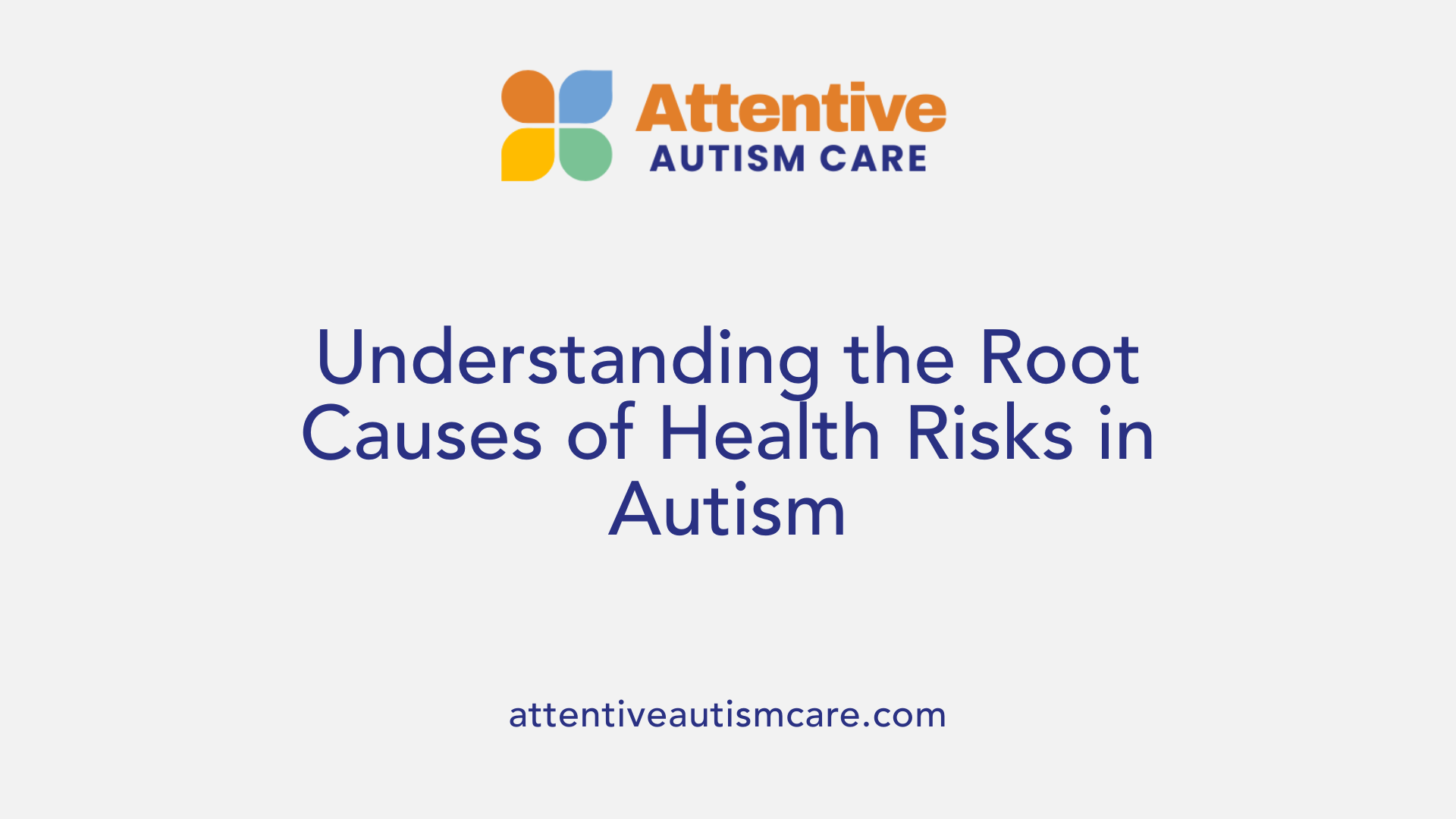
What contributing factors increase health risks for individuals with autism?
Research shows that a combination of genetic, environmental, and prenatal influences significantly impacts the health risks associated with autism spectrum disorder (ASD). These factors can contribute to the complexity of managing health in autistic individuals and often require integrated medical approaches.
Genetic factors play a crucial role in autism development. Mutations in specific genes, inherited gene patterns, and genetic conditions such as fragile X syndrome are common contributors. Fragile X syndrome, in particular, is a notable genetic cause of both autism and intellectual impairment, which complicates the overall health profile of affected individuals. Other genetic variations and inherited patterns among siblings further emphasize the hereditary aspects linked to ASD.
Environmental exposures during pregnancy also influence the likelihood of autism. Maternal infections during pregnancy, exposure to air pollution, pesticides, and harmful chemicals like lead, asbestos, and certain plastics have been associated with an increased risk. These environmental hazards can interfere with normal fetal brain development, heightening the chance of ASD and related health issues.
Birth complications and maternal health conditions are additional factors that elevate health risks. Complications at birth, such as birth trauma or hypoxia, have been linked to higher autism prevalence. Maternal health issues, including obesity, diabetes, and hypertension, contribute to adverse pregnancy outcomes. Furthermore, advanced parental age, especially older fathers and mothers, is correlated with increased autism risk, possibly due to age-related genetic mutations.
The interplay of these factors often results in complex health profiles, with many autistic individuals experiencing co-occurring health conditions like epilepsy, gastrointestinal disorders, and mental health issues. Recognizing these contributing factors allows healthcare providers to tailor early interventions and manage potential risks more effectively.
Below is a summary table highlighting these factors:
| Contributing Factors | Specific Elements | Additional Notes |
|---|---|---|
| Genetic Factors | Gene mutations, inherited genes, fragile X syndrome | Some genetic variations are passed down or occur de novo |
| Environmental Exposures | Maternal infections, pollution, chemicals, pesticides | Exposure during pregnancy can affect fetal brain development |
| Birth and Maternal Conditions | Birth complications, maternal obesity, diabetes, hypertension | Can cause or worsen neurodevelopmental issues |
| Parental Age | Advanced maternal and paternal age | Older parents have higher mutation rates affecting offspring |
Understanding these influences underscores the importance of comprehensive prenatal care, early screening, and environmental protections to reduce health risks for individuals with autism.
Scientific Insights into Secondary and Multisystem Health Risks
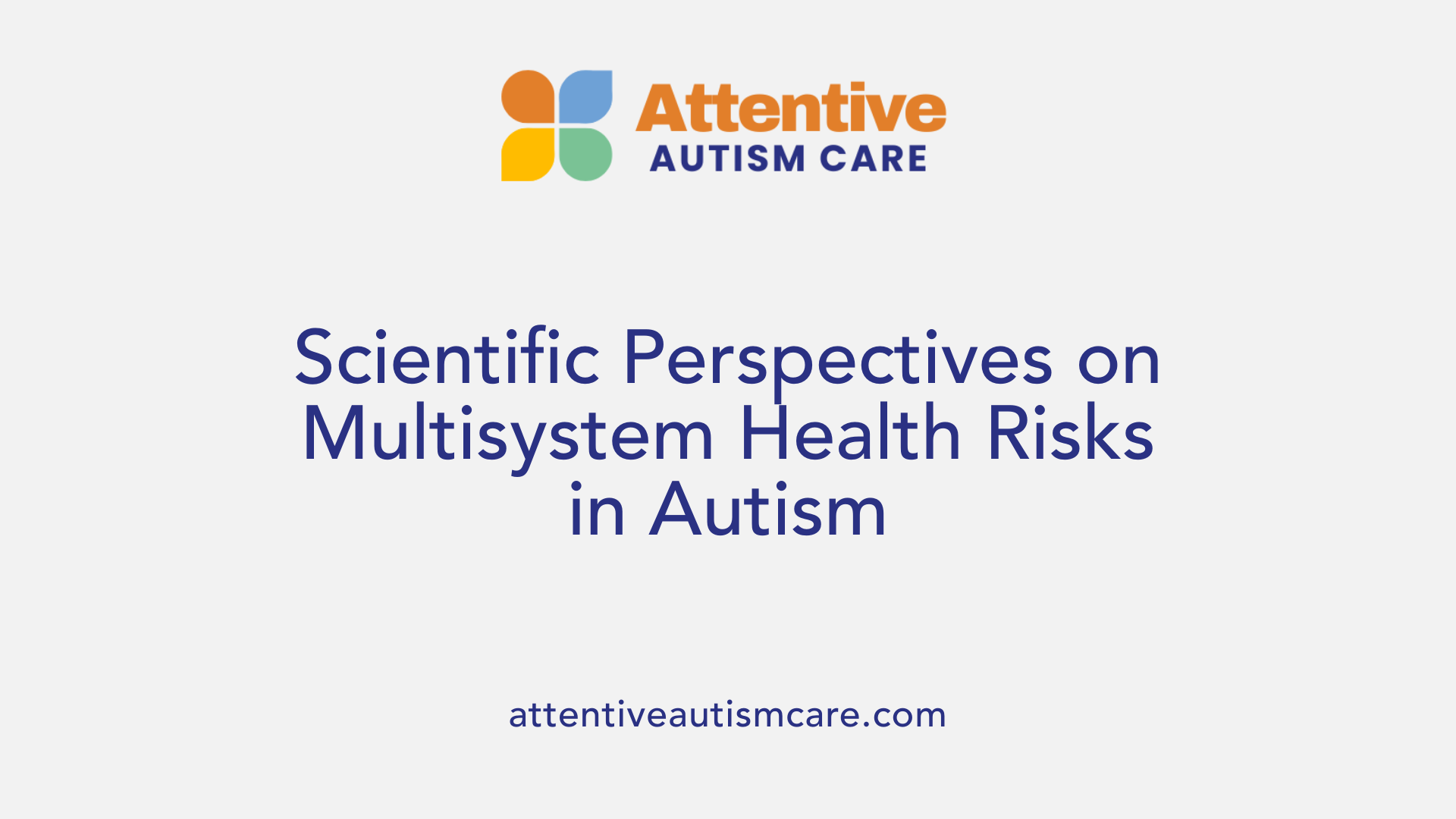
Are there scientific studies providing insights into secondary health risks in individuals with autism?
Yes, extensive scientific research has shed light on the various secondary health risks faced by individuals with autism spectrum disorder (ASD). These studies reveal that autistic individuals are more prone to several physical health conditions across multiple bodily systems.
One of the most common concerns is gastrointestinal (GI) disorders. According to Autism Speaks, about 21% of autistic children experience GI problems such as chronic constipation, abdominal pain, gastroesophageal reflux, and bowel inflammation. These disturbances can significantly impact comfort and overall health. Additionally, neurological issues like epilepsy are notable; approximately 5% of autistic children and 12.1% of adults on Medicaid have co-occurring epilepsy, with warning signs including unexplained staring, involuntary movements, and severe headaches.
Sleep problems are prevalent among autistic individuals of all ages, often leading to increased behavioral challenges, difficulty learning, and decreased quality of life. Disrupted sleep exacerbates mental health issues and hampers daily functioning.
Immune-related issues, such as allergies and inflammatory responses, are also more common, although the specific mechanisms remain under active investigation. Evidence suggests that immune dysregulation may contribute to or result from the complex neurodevelopmental patterns in ASD.
Research further highlights the elevated incidence of psychiatric conditions within this population. Anxiety affects around 17.1% of autistic children and 26% of adults; depression affects 7.5% of children and over 20% of adults. Many also experience obsessive-compulsive disorder (OCD), with some studies indicating higher rates in teens and adults compared to the general population. Bipolar disorder and schizophrenia are additional concerns, with prevalence rates of approximately 7.8% and 8.1%, respectively, particularly as individuals transition into adulthood.
The link between autism and tumor development, especially benign tumors caused by tuberous sclerosis, is another area of ongoing research. Although the exact relationship remains somewhat unclear, studies indicate that children with ASD may have a higher prevalence of such tumors.
Moreover, comorbid conditions like ADHD, anxiety, depression, and sleep disorders often co-occur with autism, creating complex health management needs. For example, about 35.3% of children and 21.1% of adults on Medicaid with ASD also suffer from ADHD.
Other multisystem issues include increased risks for metabolic conditions such as obesity and diabetes, as well as developmental challenges like speech delays, learning disabilities, and social interaction difficulties. These complexities underscore the importance of comprehensive healthcare strategies that address the wide array of secondary health risks.
Overall, this research emphasizes that individuals with autism are susceptible to a broad spectrum of secondary health problems that span physical and mental health domains. Recognizing these risks allows healthcare providers to implement early interventions, monitor health more closely, and tailor treatments to improve the quality of life for autistic individuals.
| Primary Risk Areas | Specific Conditions | Associated Challenges |
|---|---|---|
| Gastrointestinal | Constipation, Reflux, Bowel inflammation | Discomfort, nutritional issues |
| Neurological | Epilepsy, Seizures | Cognitive impact, safety concerns |
| Sleep | Disrupted sleep patterns | Behavioral issues, decreased wellbeing |
| Immune System | Allergies, Inflammation | Chronic health issues |
| Psychiatric | Anxiety, Depression, OCD, Bipolar, Schizophrenia | Emotional health, daily functioning |
| Tumors | Benign tumors (e.g., tuberous sclerosis) | Potential health risks |
This array of findings underscores the importance of multidisciplinary healthcare approaches. Early detection, continuous monitoring, and personalized treatment plans are essential to managing the complex health needs of individuals with autism spectrum disorder.
Impact on Daily Life, Education, and Family Dynamics
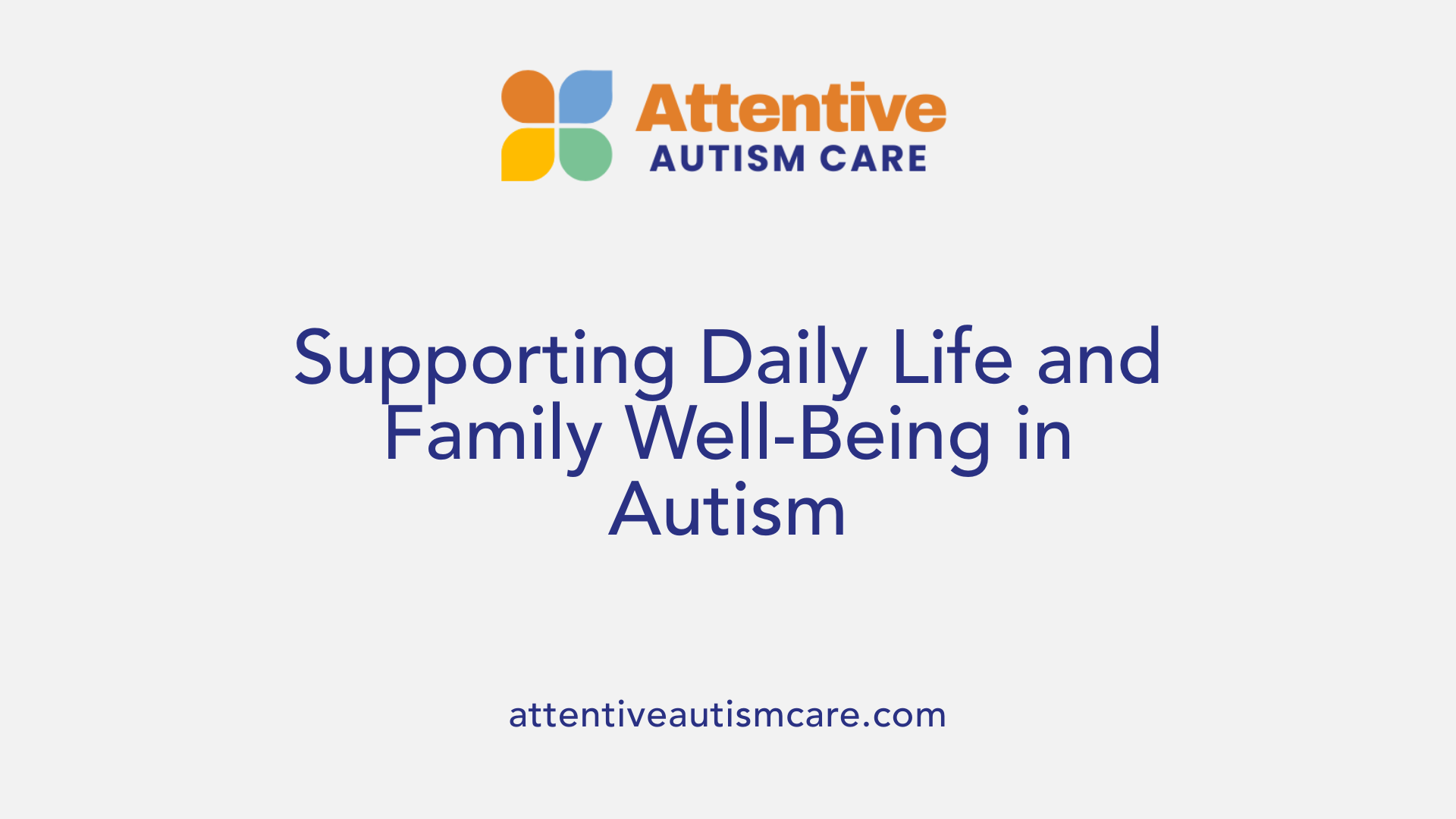
How do health complications influence daily functioning and life prospects for individuals with autism?
Autism spectrum disorder (ASD) presents various health complications that deeply affect daily functioning. Common issues such as gastrointestinal disorders, sleep disturbances, and neurological problems can interfere with focus, energy, and emotional regulation. For example, chronic constipation or gastroesophageal reflux can cause discomfort, leading to irritability and difficulty participating in daily activities.
Sleep problems are particularly common among autistic individuals, often resulting in fatigue, increased behavioral challenges, and difficulties in social interactions. These disruptions can negatively impact learning environments, reduce cognitive performance, and hinder the ability to maintain routines.
Behavioral challenges like aggression, self-injury, or wandering are frequently linked to underlying health problems or sensory sensitivities. Addressing these health concerns through medical and behavioral interventions can improve overall quality of life.
Autism can also increase vulnerability to social isolation and victimization such as bullying, which can further impair emotional well-being and social development. Family stress levels often rise when managing complex health and behavioral needs, affecting relationships and mental health.
Difficulties in school and employment are widespread. Many autistic individuals struggle to keep up with academic demands or maintain jobs due to social and communication challenges, sensory overload, or health issues. This can hinder opportunities for independent living and financial stability.
Support systems play a crucial role in addressing these challenges. Early diagnosis, multidisciplinary care, educational support, and community integration help individuals with ASD develop skills and manage health conditions effectively.
By implementing tailored interventions and fostering inclusive environments, families and caregivers can help autistic individuals navigate daily life more successfully, enhancing their prospects for independence and social participation.
| Aspect | Typical Challenges | Ways to Support |
|---|---|---|
| Social Skills | Isolation, victimization, bullying | Social skills training, peer support programs |
| Education | Learning difficulties, behavioral issues | Individualized Education Plans (IEPs), special education services |
| Employment | Job retention difficulties, social barriers | Vocational training, workplace accommodations |
| Health Management | Gastrointestinal issues, sleep disruptions, neurological conditions | Medical treatment, behavioral therapies, coordinated care |
| Independence | Living alone, self-care challenges | Life skills training, supported living arrangements |
Effective management of these health and social challenges demands coordinated efforts among healthcare providers, educators, families, and the community. Providing accessible services, early intervention, and inclusive opportunities can greatly improve daily routines and long-term outcomes for individuals with autism.
Concluding Remarks: Improving Outcomes and Quality of Life
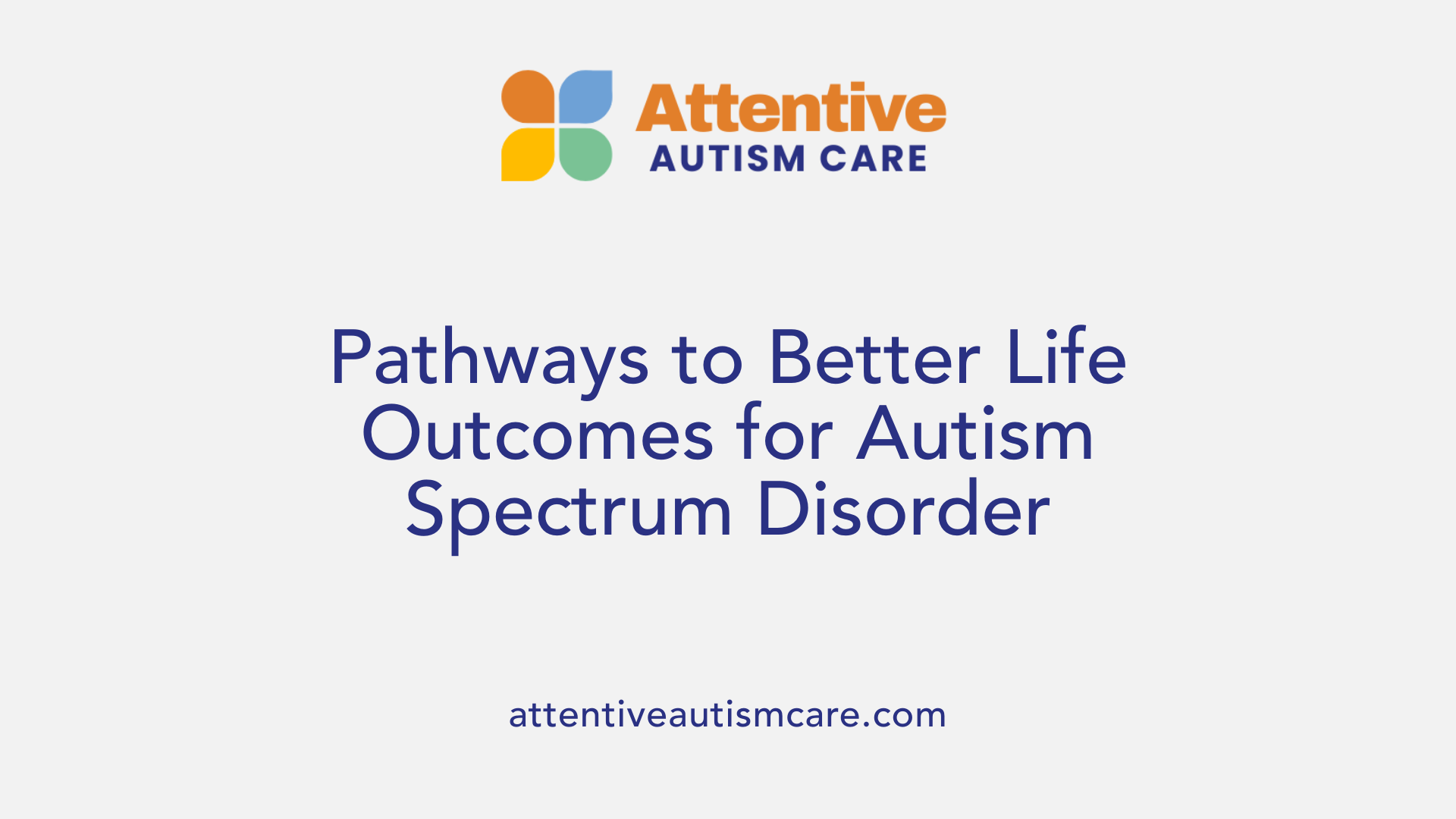
Why is early diagnosis and intervention important?
Early identification of autism spectrum disorder (ASD) plays a vital role in shaping better health and lifestyle outcomes for individuals. Recognizing signs such as limited eye contact, repetitive behaviors, and communication difficulties during early childhood allows for timely support. Studies show that initiating interventions before age three can substantially improve language skills, social interaction, and adaptive behaviors. Early diagnosis also helps in addressing associated health conditions like gastrointestinal problems, sleep issues, or co-occurring mental health disorders.
How does a multidisciplinary approach enhance care?
Managing autism requires coordinated efforts among various healthcare professionals, educators, therapists, and families. This team-based approach ensures comprehensive treatment that considers medical, behavioral, developmental, and educational needs. Regular assessments allow for tailored strategies, including behavioral therapies, medical treatments for comorbid conditions, and support for sensory sensitivities. Such collaboration not only addresses immediate challenges but also promotes long-term stability and well-being.
What role do inclusive environments and support systems play?
Fostering inclusive environments is essential for improving quality of life for autistic individuals. Educational settings that adapt teaching methods and curricula can help children succeed academically and socially. Employment initiatives that offer accommodations and understanding enable adults with ASD to contribute meaningfully in the workplace. Community awareness campaigns reduce stigma and promote acceptance, while access to supportive services ensures ongoing assistance across the lifespan.
How to enhance health and life outcomes?
The primary steps involve early detection, comprehensive care, and societal inclusion. Governments and organizations must prioritize training healthcare providers, creating supportive policies, and funding research. Addressing disparities in healthcare access, especially for those from underserved communities, is critical.
| Action Areas | Strategies | Impact |
|---|---|---|
| Early detection | Screening programs, public awareness | Faster diagnosis, early support |
| Healthcare coordination | Multidisciplinary teams, individualized plans | Better management of health and behavioral issues |
| Societal inclusion | Inclusive education, employment policies | Increased independence, societal participation |
| Research and policy | Funding, data collection, guidelines development | Improved understanding and service delivery |
What are the key steps to better health and lifestyle outcomes for individuals with autism?
Early diagnosis and intervention are crucial in significantly improving developmental, behavioral, and health outcomes for individuals with autism. Multidisciplinary approaches involving healthcare providers, educators, therapists, and families are essential for coordinated care. Promoting inclusive environments, providing tailored educational and employment opportunities, and ensuring access to supportive services enhance quality of life. Continued research and policy efforts are needed to address healthcare disparities and support the diverse needs of autistic individuals throughout their lifespan.
Summary and Future Directions in Autism Care
Understanding and managing the myriad health complications associated with autism spectrum disorder is vital for improving individual outcomes. Ongoing research into genetic, environmental, and secondary health risks offers new avenues for targeted interventions and prevention strategies. Multidisciplinary care, early diagnosis, and inclusive support systems remain the cornerstones of effective management. As awareness and understanding of autism continue to grow, so too does the potential to enhance quality of life and foster a more inclusive society for those with autism.
References
- Medical conditions associated with autism
- Autism spectrum disorder - Symptoms and causes
- 5 Autism Complications That You Should Know
- About Autism Spectrum Disorder
- Increased Risk of Autism Development in Children Whose ...
- Autism Spectrum Disorder (ASD) Symptoms & Causes
- Complications Among People With Autism
- Autism Spectrum Disorder - StatPearls
- Autism
- Autism spectrum disorder - Symptoms and causes




































































































